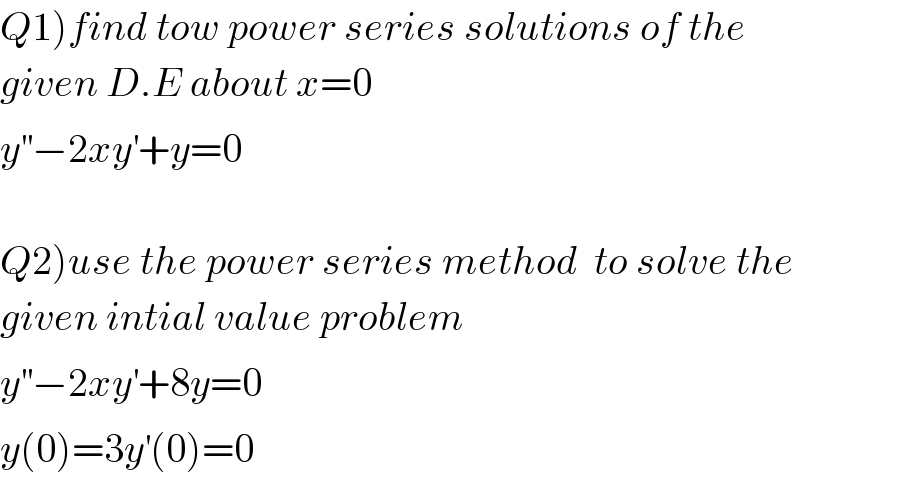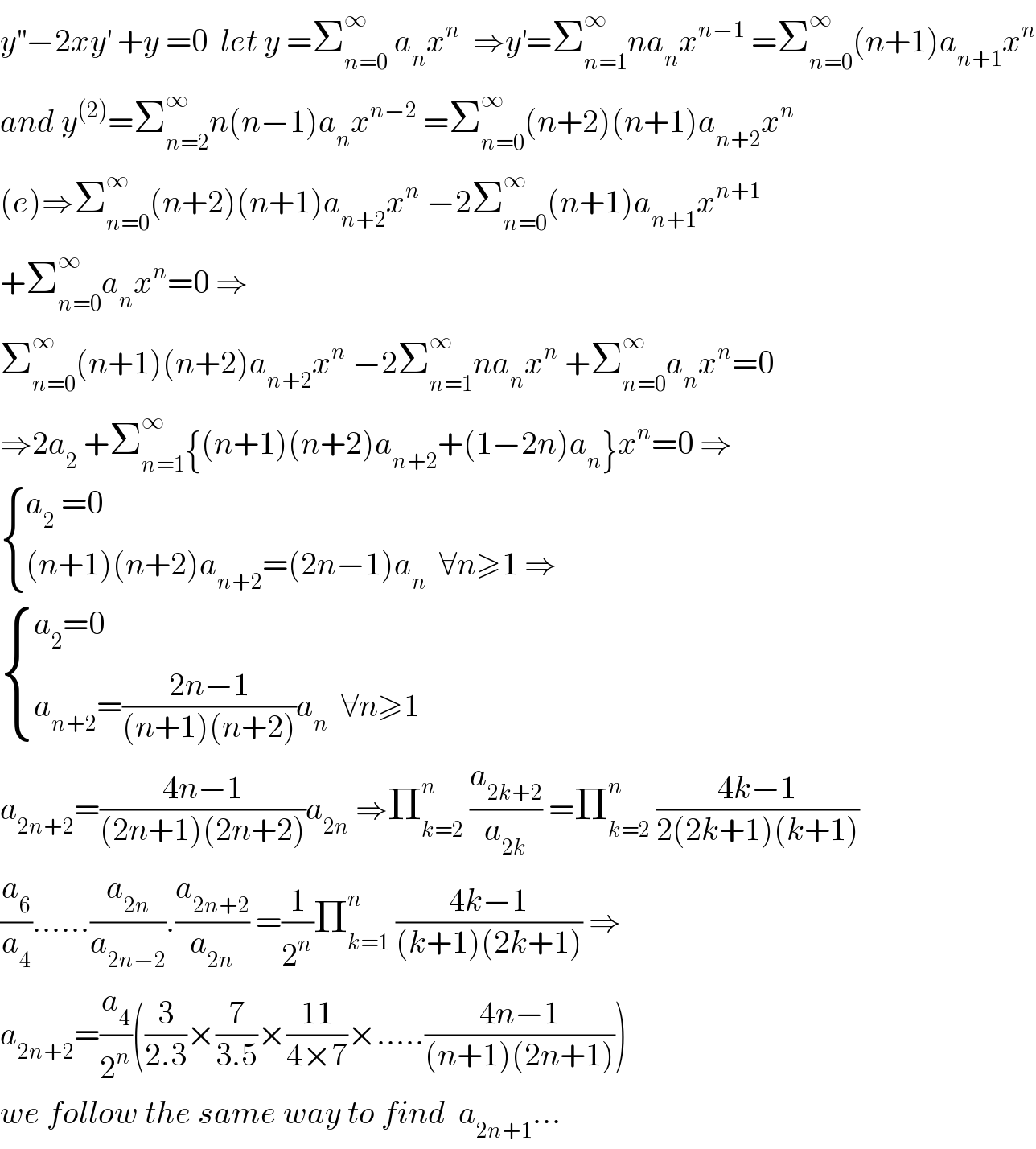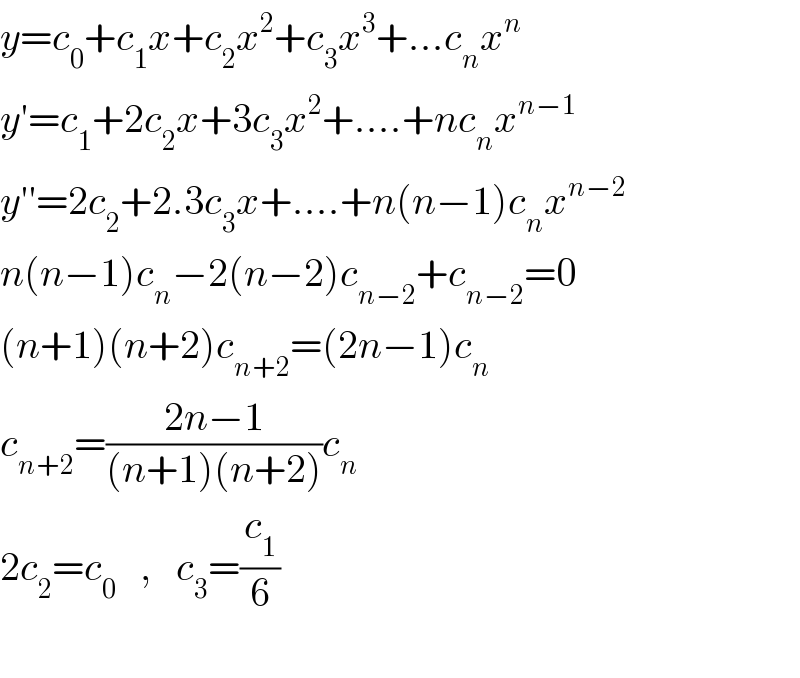
Previous in Differential Equation Next in Differential Equation
Question Number 89624 by M±th+et£s last updated on 18/Apr/20

$$\left.{Q}\mathrm{1}\right){find}\:{tow}\:{power}\:{series}\:{solutions}\:{of}\:{the}\: \\ $$$${given}\:{D}.{E}\:{about}\:{x}=\mathrm{0} \\ $$$${y}^{''} −\mathrm{2}{xy}^{'} +{y}=\mathrm{0} \\ $$$$ \\ $$$$\left.{Q}\mathrm{2}\right){use}\:{the}\:{power}\:{series}\:{method}\:\:{to}\:{solve}\:{the} \\ $$$${given}\:{intial}\:{value}\:{problem} \\ $$$${y}^{''} −\mathrm{2}{xy}^{'} +\mathrm{8}{y}=\mathrm{0} \\ $$$${y}\left(\mathrm{0}\right)=\mathrm{3}{y}^{'} \left(\mathrm{0}\right)=\mathrm{0} \\ $$
Commented by mathmax by abdo last updated on 18/Apr/20

$${y}^{''} −\mathrm{2}{xy}^{'} \:+{y}\:=\mathrm{0}\:\:{let}\:{y}\:=\sum_{{n}=\mathrm{0}} ^{\infty} \:{a}_{{n}} {x}^{{n}} \:\:\Rightarrow{y}^{'} =\sum_{{n}=\mathrm{1}} ^{\infty} {na}_{{n}} {x}^{{n}−\mathrm{1}} \:=\sum_{{n}=\mathrm{0}} ^{\infty} \left({n}+\mathrm{1}\right){a}_{{n}+\mathrm{1}} {x}^{{n}} \\ $$$${and}\:{y}^{\left(\mathrm{2}\right)} =\sum_{{n}=\mathrm{2}} ^{\infty} {n}\left({n}−\mathrm{1}\right){a}_{{n}} {x}^{{n}−\mathrm{2}} \:=\sum_{{n}=\mathrm{0}} ^{\infty} \left({n}+\mathrm{2}\right)\left({n}+\mathrm{1}\right){a}_{{n}+\mathrm{2}} {x}^{{n}} \\ $$$$\left({e}\right)\Rightarrow\sum_{{n}=\mathrm{0}} ^{\infty} \left({n}+\mathrm{2}\right)\left({n}+\mathrm{1}\right){a}_{{n}+\mathrm{2}} {x}^{{n}} \:−\mathrm{2}\sum_{{n}=\mathrm{0}} ^{\infty} \left({n}+\mathrm{1}\right){a}_{{n}+\mathrm{1}} {x}^{{n}+\mathrm{1}} \\ $$$$+\sum_{{n}=\mathrm{0}} ^{\infty} {a}_{{n}} {x}^{{n}} =\mathrm{0}\:\Rightarrow \\ $$$$\sum_{{n}=\mathrm{0}} ^{\infty} \left({n}+\mathrm{1}\right)\left({n}+\mathrm{2}\right){a}_{{n}+\mathrm{2}} {x}^{{n}} \:−\mathrm{2}\sum_{{n}=\mathrm{1}} ^{\infty} {na}_{{n}} {x}^{{n}} \:+\sum_{{n}=\mathrm{0}} ^{\infty} {a}_{{n}} {x}^{{n}} =\mathrm{0} \\ $$$$\Rightarrow\mathrm{2}{a}_{\mathrm{2}} \:+\sum_{{n}=\mathrm{1}} ^{\infty} \left\{\left({n}+\mathrm{1}\right)\left({n}+\mathrm{2}\right){a}_{{n}+\mathrm{2}} +\left(\mathrm{1}−\mathrm{2}{n}\right){a}_{{n}} \right\}{x}^{{n}} =\mathrm{0}\:\Rightarrow \\ $$$$\begin{cases}{{a}_{\mathrm{2}} \:=\mathrm{0}}\\{\left({n}+\mathrm{1}\right)\left({n}+\mathrm{2}\right){a}_{{n}+\mathrm{2}} =\left(\mathrm{2}{n}−\mathrm{1}\right){a}_{{n}} \:\:\forall{n}\geqslant\mathrm{1}\:\Rightarrow}\end{cases} \\ $$$$\begin{cases}{{a}_{\mathrm{2}} =\mathrm{0}}\\{{a}_{{n}+\mathrm{2}} =\frac{\mathrm{2}{n}−\mathrm{1}}{\left({n}+\mathrm{1}\right)\left({n}+\mathrm{2}\right)}{a}_{{n}} \:\:\forall{n}\geqslant\mathrm{1}}\end{cases} \\ $$$${a}_{\mathrm{2}{n}+\mathrm{2}} =\frac{\mathrm{4}{n}−\mathrm{1}}{\left(\mathrm{2}{n}+\mathrm{1}\right)\left(\mathrm{2}{n}+\mathrm{2}\right)}{a}_{\mathrm{2}{n}} \:\Rightarrow\prod_{{k}=\mathrm{2}} ^{{n}} \:\frac{{a}_{\mathrm{2}{k}+\mathrm{2}} }{{a}_{\mathrm{2}{k}} }\:=\prod_{{k}=\mathrm{2}} ^{{n}} \:\frac{\mathrm{4}{k}−\mathrm{1}}{\mathrm{2}\left(\mathrm{2}{k}+\mathrm{1}\right)\left({k}+\mathrm{1}\right)} \\ $$$$\frac{{a}_{\mathrm{6}} }{{a}_{\mathrm{4}} }......\frac{{a}_{\mathrm{2}{n}} }{{a}_{\mathrm{2}{n}−\mathrm{2}} }.\frac{{a}_{\mathrm{2}{n}+\mathrm{2}} }{{a}_{\mathrm{2}{n}} }\:=\frac{\mathrm{1}}{\mathrm{2}^{{n}} }\prod_{{k}=\mathrm{1}} ^{{n}} \:\frac{\mathrm{4}{k}−\mathrm{1}}{\left({k}+\mathrm{1}\right)\left(\mathrm{2}{k}+\mathrm{1}\right)}\:\Rightarrow \\ $$$${a}_{\mathrm{2}{n}+\mathrm{2}} =\frac{{a}_{\mathrm{4}} }{\mathrm{2}^{{n}} }\left(\frac{\mathrm{3}}{\mathrm{2}.\mathrm{3}}×\frac{\mathrm{7}}{\mathrm{3}.\mathrm{5}}×\frac{\mathrm{11}}{\mathrm{4}×\mathrm{7}}×.....\frac{\mathrm{4}{n}−\mathrm{1}}{\left({n}+\mathrm{1}\right)\left(\mathrm{2}{n}+\mathrm{1}\right)}\right) \\ $$$${we}\:{follow}\:{the}\:{same}\:{way}\:{to}\:{find}\:\:{a}_{\mathrm{2}{n}+\mathrm{1}} ... \\ $$
Commented by M±th+et£s last updated on 18/Apr/20

$${thanx}\:{sir}\:{and}\:{what}\:{about}\:{Q}\mathrm{2} \\ $$
Commented by mathmax by abdo last updated on 18/Apr/20

$${add}\:{the}\:{inital}\:{condition}... \\ $$
Answered by ajfour last updated on 18/Apr/20

$${y}={c}_{\mathrm{0}} +{c}_{\mathrm{1}} {x}+{c}_{\mathrm{2}} {x}^{\mathrm{2}} +{c}_{\mathrm{3}} {x}^{\mathrm{3}} +...{c}_{{n}} {x}^{{n}} \\ $$$${y}'={c}_{\mathrm{1}} +\mathrm{2}{c}_{\mathrm{2}} {x}+\mathrm{3}{c}_{\mathrm{3}} {x}^{\mathrm{2}} +....+{nc}_{{n}} {x}^{{n}−\mathrm{1}} \\ $$$${y}''=\mathrm{2}{c}_{\mathrm{2}} +\mathrm{2}.\mathrm{3}{c}_{\mathrm{3}} {x}+....+{n}\left({n}−\mathrm{1}\right){c}_{{n}} {x}^{{n}−\mathrm{2}} \\ $$$${n}\left({n}−\mathrm{1}\right){c}_{{n}} −\mathrm{2}\left({n}−\mathrm{2}\right){c}_{{n}−\mathrm{2}} +{c}_{{n}−\mathrm{2}} =\mathrm{0} \\ $$$$\left({n}+\mathrm{1}\right)\left({n}+\mathrm{2}\right){c}_{{n}+\mathrm{2}} =\left(\mathrm{2}{n}−\mathrm{1}\right){c}_{{n}} \\ $$$${c}_{{n}+\mathrm{2}} =\frac{\mathrm{2}{n}−\mathrm{1}}{\left({n}+\mathrm{1}\right)\left({n}+\mathrm{2}\right)}{c}_{{n}} \\ $$$$\mathrm{2}{c}_{\mathrm{2}} ={c}_{\mathrm{0}} \:\:\:,\:\:\:{c}_{\mathrm{3}} =\frac{{c}_{\mathrm{1}} }{\mathrm{6}} \\ $$$$ \\ $$
Commented by M±th+et£s last updated on 18/Apr/20

$${thank}\:{you}\:{sir} \\ $$
Commented by M±th+et£s last updated on 18/Apr/20

$${sir}\:{can}\:{you}\:{help}\:{with}\:{Q}_{\mathrm{2}} \:{and}\:{thank}\:{you} \\ $$
Commented by ajfour last updated on 18/Apr/20

$${dont}\:{much}\:{remember}\:{all}\:{these}, \\ $$$${its}\:{all}\:{there}\:{in}\:{Erwin}\:{Kreyzig}. \\ $$
Commented by M±th+et£s last updated on 18/Apr/20

$${ok}\:{sir}\:{thank}\:{you} \\ $$
